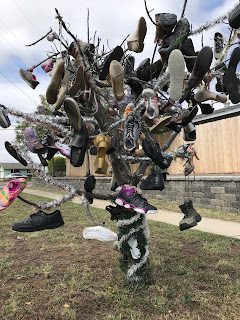I believe that we, too, are called to flourish and prosper -- in what we learn, how we interact, and relationships that challenge us to develop and become.
 |
| Blooming: do you hang onto your beauty? |
Whether our inclination is to see a cup as half empty or half full, whether we tend towards a cautious or unguarded view of others, or whether we hold onto the past rather than move towards the future, we have a responsibility to question and evolve:
- Have we noticed our habits and biases?
- Do we wonder what formed our worldview?
- Are we willing to challenge aspects of ourselves that do not promote or sustain life?
As we look at the plants around us, we see plenty of variety -- examples of flowers that hang downwards or reach upwards, large and small, colorful or ordinary. All bring beauty to the places where they are planted.... even weeds, plants that are misplaced!
 |
| Flourishing: when do we reach up out of your depths? |
For me, one of the indicators that I might be growing in my dialogue practice, is when I attract others... not necessarily to my point of view, but when we can talk, listen and add to our collective knowledge of one another. The reciprocal actions of giving and taking -- like the relationship between flowers and bees -- allows the beauty of each to flourish and prosper.
 |
| Prospering: how do we attract others? (Click on the image to see the bees!) |
Maybe, as we revel in the sunlight and warmth of these summer days, we might take delight in the interaction and synergy that occurs when we are:
- Warm and welcoming to another person;
- Accepting of the light that person brings into this world; and,
- Curious about what makes us similar and different.
May you bloom and grow this week as you encounter ALL of the beauty around you!
 |
| Larry Gardepie
(click on link for website)
|















